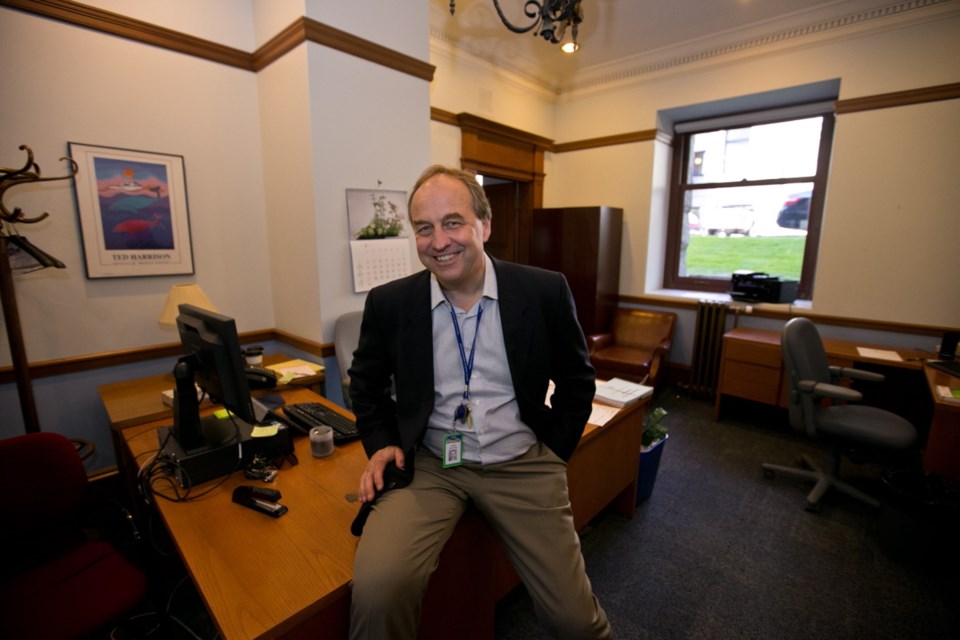B.C. Green Party Leader Andrew Weaver has introduced legislation that would require the province’s post-secondary schools to adopt sexual violence policies and properly report incidents of sexual assault.
The Oak Bay-Gordon Head MLA said the provincial government needs to do more to create a safer environment for college and university students.
He introduced the bill just a week after Saanich police announced that a male student at the University of Victoria had been arrested in connection with sexual assaults reported by four women, ages 19 and 20, at the campus.
“The problem on university campuses is that we know there’s a preponderance of sexual assaults occurring,” Weaver said. “There are concerns being expressed by students, by others, that [the incidents] are not being exposed, that there’s not a proper reporting mechanism and that the scale of what’s happening is not known.”
Weaver said his bill mirrors legislation in Ontario and would require all post-secondary institutions to have policies on how to deal with incidents and complaints of sexual violence. “It will require the reporting of data to both the government and to the board of directors on an annual period,” he said.
Schools could face penalties for failing to comply with the legislation, he said.
Weaver argues that without a law in place, colleges and universities will be reluctant to accurately report sexual violence statistics that could undermine their international reputations.
Private members’ bills rarely pass, but the B.C. Liberals have adopted aspects of Weaver’s bills before and he’s hoping that will happen again.
“This has to stop and this will only stop if we start to get the information out in the open for all to see,” he said.
Premier Christy Clark agreed Tuesday that B.C. needs to do more to support people who have been sexually assaulted on campus. But she stopped short of endorsing Weaver’s legislation.
“The point that he’s making, and the point that I agree with, is that we need to make sure we have a deep conversation with all the colleges and universities in British Columbia to ensure that they all are ready to support victims of sexual assault on campus,” she said.
Minister of Advanced Education Andrew Wilkinson said B.C. is working on a framework for a comprehensive approach to sexual violence on campuses.
“A best-practices approach provides post-secondary institutions with the most current information on how to prevent and respond to sexual violence on their campuses,” Wilkinson said.
“This approach, rather than legislation, offers post-secondary institutions the flexibility to develop programs, policies and procedures that meet the needs of their students, their institution and their broader campus community.”
But Kenya Rogers of the UVic Students’ Society said B.C. needs a legally binding approach to sexual violence instead of the current ad-hoc system.
“Often what we’re seeing is that there’s a lot of survivors who feel that the institution is failing them because they just don’t have the framework set up to know how to respond,” she said. “Everything’s done on a case-by-case basis.”
Weaver’s legislation came the same day as a protest at UVic, where a sign reading “2016 No Sexual Assault Policy? Shame” was displayed at a university entrance. It was removed before 8 a.m. Tuesday.
Bronte Renwick-Shields, chairwoman of the students’ society, said the message is the result of frustration among students over the lack of “appropriate action” on sexual violence. “What a lot of students find frustrating is that campus security responded far quicker to this … graffiti than we have seen it respond to real sexual assault cases,” Renwick-Shield said. “Sexual assault cases can take months before there is any action but this sign got a response within minutes.”
The university has said it acted immediately to assist victims of the recent sexual assaults in filing a report with Saanich police and offered support through its counselling and health services.
Saanich police are recommending five counts of sexual assault against a male student, who is not allowed on campus. He is expected in court in April.
“Sexualized violence is never acceptable and UVic is deeply committed to providing all members of our campus community with a safe, supportive and respectful environment,” says a notice posted on its website.
The University of Victoria does not have a standalone sexual violence policy. Procedures and processes for responding to sexual assault are covered by respectful behaviour policies, including a non-academic misconduct policy and a violence and threatening-behaviour policy, UVic says.
The UVic students’ society has long called for a specific policy on sexual assaults that would provide a framework to assist victims.
Rogers said the problem of sexual violence on campuses is so widespread that it deserves its own policy.
“It affects so many different women in so many different ways and it also affects people who hold vulnerable identities and it definitely needs the attention of its own policy,” she said.
“That’s why I think this is really important — this act that is being brought forward by [Weaver].”
— With files from Richard Watts



